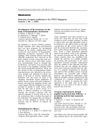 5 citations,
May 2004 in “International Journal of Cosmetic Science”
5 citations,
May 2004 in “International Journal of Cosmetic Science” Versican is important for hair growth and could help find new hair regrowth treatments.
February 2020 in “Int J Biologicals” Super-activated platelet lysate significantly promotes hair regrowth in mice with androgenetic alopecia.
September 2016 in “Journal of dermatological science” FGF18 helps hair follicles resist radiation by stopping hair growth cycles.
 7 citations,
January 2019 in “PeerJ”
7 citations,
January 2019 in “PeerJ” A protein called sFRP4 can slow down hair regrowth.
 21 citations,
October 2009 in “Biochemical Engineering Journal”
21 citations,
October 2009 in “Biochemical Engineering Journal” Stem cell therapy is a promising approach for hair regrowth despite potential side effects.
 November 2005 in “Nature Reviews Molecular Cell Biology”
November 2005 in “Nature Reviews Molecular Cell Biology” The protein hairless is important for hair regrowth because it stops the protein wise from blocking the hair cycle.
6 citations,
November 2018 in “American journal of transplantation” UV light helped human hair transplants survive in mice without broad immunosuppression.
4 citations,
June 2021 in “Frontiers in Pharmacology” Bone marrow stem cells and their medium help hair regrowth.
 1 citations,
July 2010 in “Dermatologic Surgery”
1 citations,
July 2010 in “Dermatologic Surgery” Splitting one hair follicle into two can help regrow hair with a 50% to 70% success rate, useful when donor hair is limited.
 1 citations,
November 2017 in “Journal of Investigative Dermatology”
1 citations,
November 2017 in “Journal of Investigative Dermatology” Platelet-rich plasma and microneedling could potentially help hair regrowth in alopecia areata patients, but more research is needed.
 January 2022 in “Stem cell biology and regenerative medicine”
January 2022 in “Stem cell biology and regenerative medicine” Stem cell therapies show promise for hair regrowth but need more research to confirm effectiveness.
 32 citations,
May 2020 in “European Journal of Pharmacology”
32 citations,
May 2020 in “European Journal of Pharmacology” Stem cell therapies show promise for hair regrowth but face production and application challenges.
 April 2010 in “The FASEB Journal”
April 2010 in “The FASEB Journal” Korean ginseng berry may help with hair regrowth.
 2 citations,
December 2022 in “Pharmaceutics”
2 citations,
December 2022 in “Pharmaceutics” The enzyme pyruvate kinase M2 helps hair regrowth and could be a potential treatment for hair loss.
 April 2020 in “Trends in Immunotherapy”
April 2020 in “Trends in Immunotherapy” Combining triamcinolone acetonide and immunotherapy can help regrow hair in some alopecia totalis patients.
 6 citations,
October 2000 in “International Journal of Dermatology”
6 citations,
October 2000 in “International Journal of Dermatology” Preventing hair loss is more effective than regrowth; oral finasteride is a realistic option.
 June 2020 in “Applied sciences”
June 2020 in “Applied sciences” A new semi-automatic hair implanter could make hair transplants easier, more successful, and more accessible.

γδTregs may help treat autoimmune diseases like alopecia areata by promoting hair regrowth and reducing immune attacks.
 1 citations,
February 2018 in “Madridge journal of dermatology & research”
1 citations,
February 2018 in “Madridge journal of dermatology & research” The plant extract remedy Satura® Rosta promotes hair growth and regrowth without negative effects.
 2 citations,
August 2024 in “International Journal of Dermatology”
2 citations,
August 2024 in “International Journal of Dermatology” Adipose stem cell-derived exosomes are safe and effective for hair regrowth in AGA patients.
 57 citations,
November 1998 in “Wound Repair and Regeneration”
57 citations,
November 1998 in “Wound Repair and Regeneration” Hair papilla cells can create and regenerate hair bulbs under the right conditions.
August 2024 in “Journal of Controlled Release” A new treatment using hybrid vesicles with gold nanoparticles and finasteride significantly improves hair regrowth for androgenetic alopecia.
2 citations,
February 2022 in “Genomics” Researchers discovered new cell types in goat hair follicles that could help understand hair regrowth and human hair loss.
 June 2024 in “Advanced therapeutics”
June 2024 in “Advanced therapeutics” The new hydrogel dressing effectively kills bacteria and helps wounds heal faster with hair regrowth.
 April 2016 in “Journal of Investigative Dermatology”
April 2016 in “Journal of Investigative Dermatology” Pdgfα signaling helps maintain fat cells in the skin and is important for hair growth, wound healing, and fighting infections.
 April 2018 in “The journal of investigative dermatology/Journal of investigative dermatology”
April 2018 in “The journal of investigative dermatology/Journal of investigative dermatology” Electrical epilation damages hair follicles and surrounding skin, likely preventing hair regrowth.
9 citations,
October 2021 in “Journal of Cosmetic Dermatology” Microneedling is an effective and minimally invasive treatment for hair loss.

The PTH-CBD injection improved hair regrowth better than the daily ruxolitinib pill in mice.
 April 2023 in “The journal of investigative dermatology/Journal of investigative dermatology”
April 2023 in “The journal of investigative dermatology/Journal of investigative dermatology” A PTH-based treatment improved hair regrowth better than ruxolitinib in a mouse model of hair loss.
 179 citations,
April 2012 in “Nature Communications”
179 citations,
April 2012 in “Nature Communications” Regenerated fully functional hair follicles using stem cells, with potential for hair regrowth therapy.























